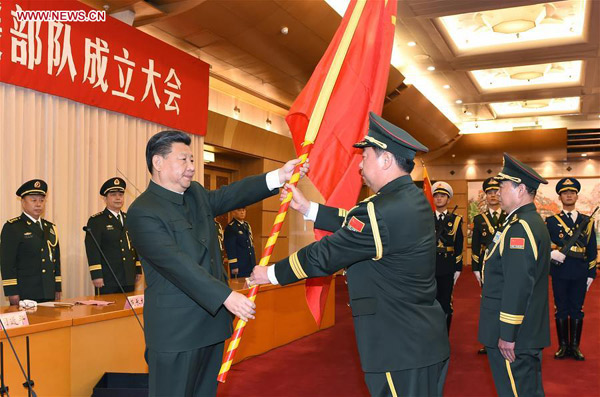Rocket Force to protect national interests
By Zhang Zhouxiang (China Daily) Updated: 2016-01-05 08:11
 |
|
Chinese President Xi Jinping (L F), confers the military flag to Li Zuocheng (C F), commander of the Army of the Chinese People's Liberation Army (PLA), and Liu Lei, political commissar of the Army, in Beijing, capital of China, Dec. 31, 2015. The general commands of the PLA Army, Rocket Force and Strategic Support Force were founded on Thursday. [Photo/Xinhua] |
At an official ceremony of the People's Liberation Army on Dec 31, top leader Xi Jinping, conferred military flags on the general command of the People's Liberation Army Rocket Force. The Second Artillery Force, founded in 1966 as China's core strategic deterrent force, has been officially renamed and promoted as one of the four army units of the PLA.
"It was mainly for secrecy reasons that China named its first missile force Second Artillery Force in 1966," says Shao Yongling, a professor at the PLA Rocket Force Commanding Academy, which was known as the SAF Commanding Academy. "But the SAF was not very different from other artillery forces of the time. Its shooting range was hundreds of kilometers, and it served as a supporting force of the army ." Moreover, most of the first SAF officers and soldiers were later shifted out of the artillery force.
Of course, it is no longer necessary for China to hide its missile forces under a vague name. So, by giving it a new name and making it a distinct armed unit different from a branch, China is promoting military transparency, Shao says.
For long, the SAF commander's designation has been the same as that of corresponding officers in the PLA Navy and the PLA Air Force. The command system of the force, too, has been similar to that of the other two armed forces. This means not too many changes will take place in the armed unit within a short period.
The reform will be rather influential in the long run, however. Apart from the high possibility of being strengthened, "being a distinct armed unit means the Rocket Force can now fight independently", Shao says. "In contrast, a branch is supposed to only support other forces, a definition that is incompatible with the Rocket Force's capacity and actual role."
The reform is recognition of the growing capability of China's missile forces; it also raises expectations of its better performance in the future, she says.
- China inaugurates PLA Rocket Force, Xi confers flags
- China releases guideline on military reform
- '2nd aircraft carrier to have military focus'
- Three new military branches created in key PLA reform
- Beijing wants private financing for weapons and military equipment
- President Xi stresses importance of military newspaper

I’ve lived in China for quite a considerable time including my graduate school years, travelled and worked in a few cities and still choose my destination taking into consideration the density of smog or PM2.5 particulate matter in the region.











